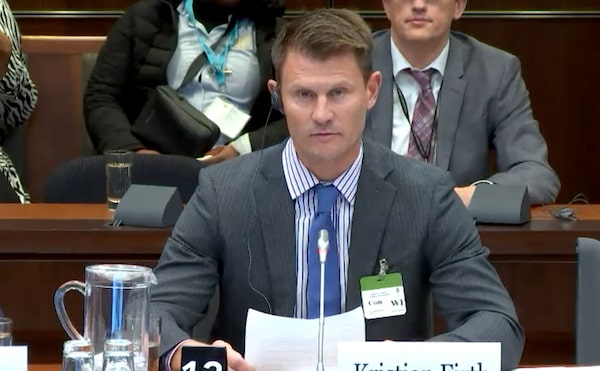
GCStrategies managing partner Kristian Firth testifies regarding ArriveCan app at the company’s parliamentary committee appearance in October, 2022. Mr. Firth and business partner Darren Anthony were scheduled to appear at the government operations committee on Tuesday afternoon.Handout
The two-person IT staffing company at the centre of contracting misconduct allegations being investigated by the RCMP defied a committee summons Tuesday, citing mental health concerns.
Members of the government operations committee met behind closed doors for about an hour to discuss the situation, but opted not to escalate the matter for now.
Conservative MP Larry Brock said after the meeting that the committee decided to give GCStrategies more time in light of personal circumstances and MPs will invite the company back early in the new year.
GCStrategies managing partner Kristian Firth and business partner Darren Anthony were scheduled to appear Tuesday afternoon to answer more questions about contracting allegations, as well as their role as the company that received the most outsourcing work on the ArriveCan app for cross-border travellers.
Mr. Firth sent a letter to the committee on Monday informing MPs that neither of them will be attending.
He wrote that although he had previously testified before MPs and provided extensive documentation, they have been described as obstructionist by the committee.
“As a result of this study, both of us, along with our families, have been subjected to something we never could have imagined,” he wrote, according to a copy of the letter obtained by The Globe and Mail. “We have been berated by a relentless campaign of threats, insults and harassments by email, phone and online. As painful as it is, all of these have been saved and documented. Many are vile, violent and anti-immigrant threats directed at us.”
Mr. Firth is originally from southern England. According to a 2018 profile in the Ottawa Business Journal, he graduated with an architecture degree from the University of Plymouth and was coaching rugby in Barbados when visiting players from Canada persuaded him to move to this country. He has spent most of his career in IT sales and helped launch GCStrategies in 2015.
In his letter to the committee, he said their “business has crumbled” and they have both received medical direction to not participate in any activity that would worsen their mental health.
Mr. Firth spent more than a year arranging meetings between a software company called Botler and various government officials. The Canada Border Services Agency ultimately approved a project for Botler’s software, but the company expressed financial transparency concerns about layers of subcontracting and cozy ties between Mr. Firth and government officials.
Botler’s founders submitted a detailed list of allegations to the CBSA in a November, 2022, report that included claims that their work experience was inflated without their knowledge.
The CBSA responded by approving internal reviews and referring the allegations to the RCMP, which is investigating.
In a Nov. 2 committee appearance, Mr. Firth said he had altered Botler founders’ résumés and experience in a procurement matrix that was submitted to the government through two other IT staffing firms, Coradix and Dalian.
He called it “a regrettable mistake” and not something he did frequently.
The Globe had previously reported that the submitted documents included a detailed description of a company that doesn’t exist.
A few days after Mr. Firth’s testimony, the CBSA announced that it had temporarily suspended all contract work involving the three staffing companies pending a review.
The three companies have altogether received nearly half a billion dollars in federal outsourcing work over the past decade.
Botler did not work on ArriveCan but its allegations involve the three staffing companies, which were among the top recipients of ArriveCan outsourcing work. Botler also raised concerns about public servants who were also involved with ArriveCan.
Parliamentary committees have the power to issue a summons requesting individuals to appear. They can also order the production of government documents. If necessary, they can escalate matters to the full House of Commons and ask MPs to approve having the Speaker issue a warrant.
Mr. Brock said the committee is planning to hold more hearings into Botler’s allegations and ArriveCan and will push to ensure previous witnesses, including government officials, hand over promised documents.
“There’s still a number of outstanding disclosures that we’re waiting for. Some have come in. Quite a few have not,” he said.
One of the most high-profile cases of a committee summons was in 2007, when German-Canadian businessman Karlheinz Schreiber was brought to Parliament Hill in handcuffs with a police escort to testify before a committee about his business relationship with former prime minister Brian Mulroney.
The parliamentary rules state that in theory, the House of Commons has the right to confine individuals as a punishment for contempt and ignoring an order, but this power has not been used since 1913.
In that case, a former company president named R.C. Miller was called to appear before a committee that was studying allegations of bribery involving government contracts.
Mr. Miller appeared twice with legal counsel in early 1913, but refused to answer any questions. The House ordered that he be taken to the Carleton County jail until he was ready to answer questions. According to the Canadian Parliamentary Review, there is no parliamentary record of his release, but it is assumed that he remained in jail until the House prorogued 3½ months later.
 Bill Curry
Bill Curry